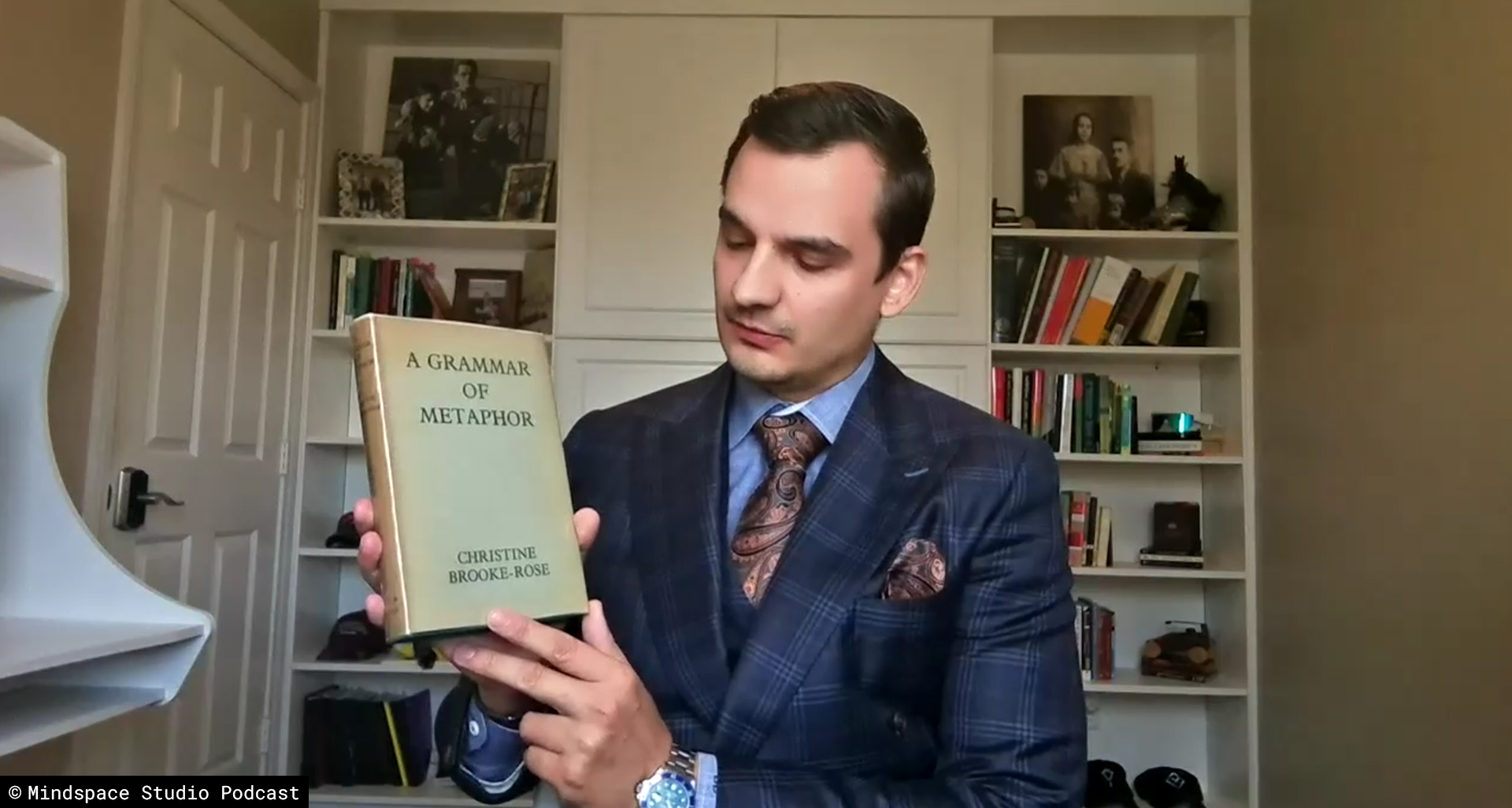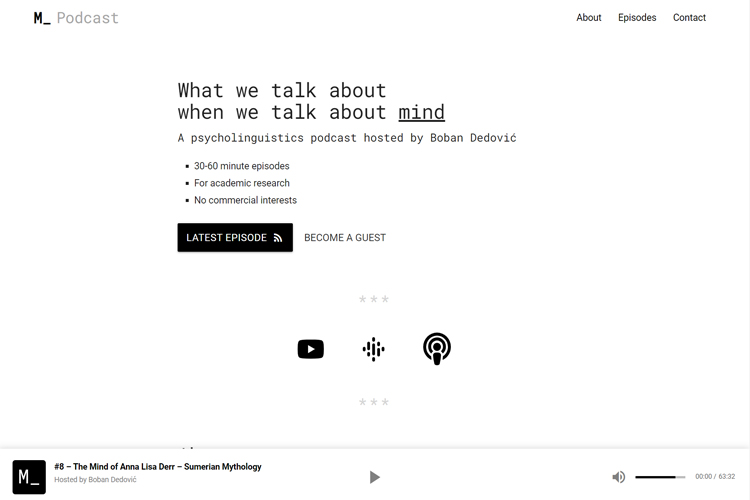Credits
Partial Transcript
Boban Dedović Host
00:11 Hello. I'm Boban Dedović and this is episode four of the "What we talk about when we talk about mind" podcast.
Boban Dedović Host
00:18 Today I have the pleasure of interviewing Dr. Brian McVeigh. He's a prolific author and experienced anthropologist that's made incredible contributions to the field of psycholinguistics, both modern and ancient. He attended the State University of New York at Albany, where he received an undergraduate degree in political science as well as professional training in anthropology. He also received his PhD from Princeton University in the same field. He was also a student of Julian Jaynes, who wrote the book called The Origin of Consciousness that we discussed last week in episode three with Marcel Kuijsten. Brian's also a specialist on Japanese culture, a subject he has written about and worked on as part of his time over on that continent.
Boban Dedović Host
01:05 Today we're going to be talking about a few of his books as well as how they relate to psychology and language. One of these is called The Psychology of the Bible; and the segment we discuss looks at biblical texts and statistically analyzes the frequency of some words related to mental processes. The second book we're going to be talking about is called A Psychohistory of Metaphor, which looks at the importance of metaphor for generating this notion of mind that we're very familiar with. He also introduces us to his concept of conscious interiority, which is one of the ways that we use mind and mind space. I'm very excited to discuss with Brian what he talks about when he talks about mind.
Boban Dedović Host
01:48 For today's hat we have the word kꜢ ka. It comes to us from the Egyptian language and from the Egyptian hieroglyphic writing system. It's represented by two hands uplifted above the head, sometimes with some details in the hands, sometimes not. And, oftentimes there's a little stroke right below, but sometimes there isn't a stroke as well. This word is oftentimes translated as "mind," "soul," "spirit," "double," "fortune," but it also has other fairly confusing uses as well.

Boban Dedović Host
02:23 For example, the name is oftentimes used in kings' names. You'll see kꜢ ka somewhere in the middle, like Kaneset, for example. But, sometimes, kꜢ ka is like a location. For example, in the Middle Egyptian Story of the Shipwrecked Sailor, the shipwrecked sailor ends up going to the island of the kꜢ ka; so it's being referred to as a place, although nobody has found the island as far as I understand. So that's the hat for the day. It's the Egyptian symbol kꜢ ka with two arms uplifted.
Boban Dedović Host
02:56 Our book recommendation for this week is A Grammar of Metaphor. It was written by Christine Brooke-Rose in 1958 and it looks at a corpus of Old English literature, such as those works of Shakespeare and Chaucer, among others. And it looks at metaphor as a very simple definition: one word replacing the meaning of something else. And the book's claim to fame is that it focuses on the grammatical relationships between idioms of interest, not just the idea content, or what they mean. And Christine Brooke-Rose goes through the number of different forms that these idioms can take and she analyzes the grammatical relationships between the words. I definitely recommend it if you're looking for something introductory that's going to be based on more modern texts. Again, the book is called A Grammar of Metaphor by Christine Brooke-Rose.

Boban Dedović Host
03:54 Could you tell us a little bit about your background, perhaps where you studied, some of your extensive time that you've spent in Japan studying in a cross-cultural standpoint, as well as some of your biggest academic influences?
Dr. Brian J. McVeigh Guest
04:08 Sure. So as an undergrad, I just went to a state school and I studied political science and Asian studies. I was always interested in philosophy. Then I went on, I got a master's in anthropology and, actually before that, I spent a year in China because I was interested in Asia. And then I joined the grad school at Princeton University to get a PhD in the anthropology department. But I wanted to investigate psychological anthropology. Even though originally I was interested in China, I developed an interest in Japan. So, for my dissertation, I decided to go to Japan. And I wanted to study spirit possession because I was interested in the mind from a sort of a philosophical point of view. What is the mind? How come people claim that they get possessed? And if you ever watched classic possession, it looks like there is two or three people inside an individual. So I was fascinated by that. And while I was at Princeton, I had a hard time preparing to go into the field looking for academic works that tried to explain the nature of spirit possession. They would just say, oh, it's trance or it's hypnosis. It's not for one thing, but that doesn't really tell us anything. Nobody seemed to be interested in spirit possession. Lots of descriptions in the ethnographic literature, but no real theoretical understanding.
Dr. Brian J. McVeigh Guest
05:45 And then I remembered, wait a second. When I was in high school, my mother gave me a book by this guy Julian Jaynes. And he had a whole chapter on spirit possession; I was always fascinated by what Jaynes had said. In fact, in the late seventies, I even wrote him a letter and he wrote back. So he was always sort of in the back of my mind and as it turned out, very fortuitous for me, Jaynes happened to be at Princeton. So I marched over to the psychology department, which was housed in the building right in next to the building where the anthropology department was. Even though they were very close, there was no interdisciplinary love. I mean, the psychologists, the anthropologists did not really communicate with each other. But in any case, I went and I talked to Jaynes. He was very enthusiastic, very welcoming, he encouraged me. And so I went to Japan. I finished my dissertation on spirit possession and then I ended up living in Japan and I pursued other interest, not just psychological anthropology, and then came back to the US. I taught at University of Arizona for a while, but something was missing. And I decided that I am really going to devote myself to Jaynes. I really think that Jaynes offers us a completely new paradigm to understand human nature. And, not to be too dramatic, I really do think he is the Darwin of psychology. I think he really doesn't answer all the questions about psychology, but he certainly answers a lot of them. So, in any case, but something was missing. I was at the University of Arizona and I decided that I should really pursue Jaynes, not just by looking at ancient history, not just by studying spirit possession and language, but by going into psychology. And I decided to go into mental health. So I became a mental health counselor. And that's what I do today.
Boban Dedović Host
07:50 It sounds like, based on your perspective, Jaynes' book The Origin of Consciousness, and his chapter on consciousness being generated by both language and by means of metaphor, it sounds like that was very persuasive to you at the time as a scholar during your formative years. And was that something that you kept in mind while you traveled through Asia and conducted your anthropological studies?
Dr. Brian J. McVeigh Guest
08:18 Yes, in fact, it was. So I'm not a natural-born linguist, but I've had to study a number of languages. And what strikes me is, no matter what language you study, there are going to be metaphors that are going to work when they attempt to describe psychological processes the way that Jaynes described it himself in his book. So whether it's Chinese or Japanese, in fact, in the case of Japanese, I did publish an article on mental language. The article appeared back in the '90s in the Journal of Pragmatics, and the claim I make in that article is very Jaynesian. In fact, I use this sort of theory he developed that you're very well aware of, about how in early times, all psychological vocabularies went through these different stages. And Jaynes lists four stages and basically begins with the body and then becomes a little more abstract with bodily experiences. And then we think people would assume that there's some sort of entity inside them, some sort of agency. And then eventually, after a number of centuries, what would happen is, you would have subjective consciousness. But the idea here is that subjective consciousness, it's like a ladder. It's resting on these earlier stages of development. And so, in any case, that's what I try to show in this article on Japanese mental language.
Boban Dedović Host
09:57 You remarked that the chapter that really captivated your attention by Julian Jaynes' book, The Origin of Consciousness, was the one on possession, that he had a whole chapter. Well, I remember that excitement that you had. For me, it was when I read Book I, Chapter III, I believe, "The Mind of Iliad." I got about halfway through that chapter and I immediately knew that I would be spending a good portion of my time and energy into reconciling those citations and counting up some of the words which ultimately ended up happening. But, it's interesting how we read something and it captures our attention. Now, moving on, I'm very curious; I've read through a number of your books and I'm familiar with most of the background literature and the concepts without, obviously, the personal experience that you've had, as well as your unique training. But, you mentioned the word interiority when it comes to mind and mind space, and I have my own understanding of it. But would you be able to explain, just for the listener, what do you mean when you talk about interiority with respect to the word mind and psychological processes that people go through?
The rest of this transcript is not quite ready. Check back soon.
Works Referenced
(In order of appearance)
Christine Brooke-Rose, A Grammar of Metaphor (London, England: Secker & Warburg, 1958).
Julian Jaynes, The Origin of Consciousness in the Breakdown of the Bicameral Mind (Boston, MA: Houghton Mifflin, 1976). [https://omnika.conscious.ai/stable/345]
Brian J. McVeigh, “Standing stomachs, clamoring chests and cooling livers: Metaphors in the psychological lexicon of Japanese,” Journal of Pragmatics 26, no. 1 (1996): 25–50.
Brian J. McVeigh, The “Other" Psychology of Julian Jaynes: Ancient Languages, Sacred Visions, and Forgotten Mentalities (Exeter, United Kingdom: Andrews UK Limited, 2018).
Brian J. McVeigh, The Psychology of the Bible: Explaining Divine Voices and Visions (Exeter, United Kingdom: Andrews UK Limited, 2020).
Brian J. McVeigh, A Psychohistory of Metaphors: Envisioning Time, Space, and Self Through the Centuries (Lanham, MD: Lexington Books, 2016).
Boban Dedović, “‘Minds’ in ‘Homer’: A Quantitative Psycholinguistic Comparison of the Iliad and Odyssey” (Conference Paper, 12th International Conference on the Mental Lexicon, Niagara-on-the-Lake, Ontario, Canada, October 11–14, 2022). [https://omnika.conscious.ai/stable/193; DOI 10.13016/9hwb-kvrx]
Transcript Notes

Boban Dedović
Person · Psycholinguist
Boban Dedović (Apr. 8, 1989 –) is a Croatian-American psycholinguist, technologist, scholar of ancient languages, and podcast host. He was born in the former Yugoslavia and moved to the United States at the age of seven. He studied both religions of antiquity (B.A.) and social psychology (B.S.) at University of Maryland in College Park before earning his graduate degree from the University of Chicago... Read more
See also: mindspace.studio bobandedovic.com twitter.com

Mindspace Studio Podcast
Website by Boban Dedović
Mindspace Studio is a psycholinguistics-themed podcast hosted by Boban Dedović, a Croatian-American psycholinguist and technologist. It was started in January of 2021 while Dedović was a graduate researcher at the University of Chicago. The program provides thrity to sixty minute episodes focused on language, psychology, and other related fields of study. It is available on YouTube, Apple Podcasts, and Google Podcasts... Read more
See also: youtube.com podcasts.apple.com podcasts.google.com conscious.ai
Heads up
This page contains a Guided Transcript
Whenever you click on a blue link that contains the panel icon chrome_reader_mode, a knowledge panel will appear on the right side of your device.
These panels provide verified, accurate information about people, books, and other things that are relevant to the discussion. The links take you to relevant websites related to source materials, as shown below:
See also: mindspace.studio
